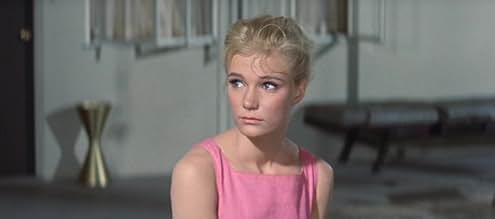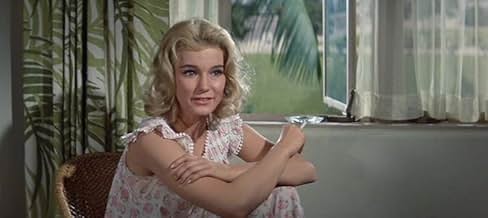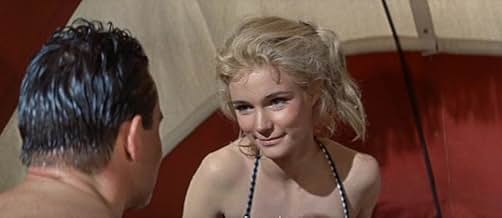VALUTAZIONE IMDb
6,7/10
3178
LA TUA VALUTAZIONE
Aggiungi una trama nella tua linguaFour very different college girls drive to Fort Lauderdale, Florida for spring break and seek out various adventures and romance for themselves.Four very different college girls drive to Fort Lauderdale, Florida for spring break and seek out various adventures and romance for themselves.Four very different college girls drive to Fort Lauderdale, Florida for spring break and seek out various adventures and romance for themselves.
- Premi
- 2 candidature totali
Carol Byron
- Sybil
- (non citato nei titoli originali)
John Cliff
- Policeman at Hospital
- (non citato nei titoli originali)
Oliver Cross
- Nightclub Patron
- (non citato nei titoli originali)
Jack Deery
- Nightclub Patron
- (non citato nei titoli originali)
Amy Douglass
- Dr. Raunch
- (non citato nei titoli originali)
Dennis Durney
- Young Man
- (non citato nei titoli originali)
Trama
Lo sapevi?
- QuizDolores Hart left Hollywood a few years after this movie was released and became a Benedictine nun; she has been a Mother Superior for many years. As a member in good standing of the Academy of Motion Picture Arts and Sciences, she is the only nun who votes for the Oscars.
- BlooperWhen the kids are first introduced to Basil's jazz band, hundreds of kids rush to the bar, with the main characters in the rear. Yet, the main characters somehow manage to find one of the few tables in the bar.
- Citazioni
Police Captain: Wait a minute! Haven't I seen you in here before?
Lola Fandango: Just once, and it was purely by accident. The night my strap broke?
[she shows her very revealing top]
- Curiosità sui crediti"and introducing Connie Francis"
- ConnessioniFeatured in Where the Boys Were: A Retrospective (2004)
- Colonne sonoreWhere the Boys Are
Words by Howard Greenfield
Music by Neil Sedaka
Performed by Connie Francis (uncredited)
Courtesy of Nevins - Kirshner
Recensione in evidenza
Forty-five years have elapsed since its original release, but it is amazing how this 1960 film introduced a particular genre that continues to be produced today granted in a far more explicit manner - the spring-break, beach-party movie where attractive teens go through a sun-drenched mating ritual and somehow love triumphs over carnal knowledge. Back then, the concept didn't seem quite as jaded as it does now, and consequently there is an entertaining naiveté about the timeworn story of four co-eds from a snowy Midwestern college who journey to Ft. Lauderdale for spring break to meet boys.
The plot is based on the then-accepted notion that girls in college are only marking time waiting for husbands to come along, but the journey to that goal depends on the girl. The four in question are Merritt, a smart blonde who is not living up to her academic potential as she questions the moral code around premarital sex; Melanie, so deeply insecure she mistakes sex for love with a less-than-honorable Ivy Leaguer; Tuggle, a tall brunette who zeroes in on an even taller, eccentric hitchhiker; and Angie, the supposedly plain one who gets used to being ignored by men.
Directed in a perfunctory fashion by Henry Levin, this is not the type of movie where you are terribly impressed with the performances, but I have to say the acting is certainly miles above subsequent beach-party movies. Elvis' former leading lady Dolores Hart plays Merritt credibly even as she is being seduced by a youthful George Hamilton wanly playing Ryder, a well-to-do Ivy Leaguer with a conveniently located yacht. As the most troubled of the girls, Yvette Mimieux (always loved her name) accurately captures the constantly forlorn, little-girl-lost state of Melanie, a teen-aged Blanche du Bois in the making.
So pert and charming as Angie, Connie Francis actually seems miscast as a plain-Jane, especially when she sings "Turn on the Sunshine" with a stage polish completely out of character. The standout is Paula Prentiss who portrays Tuggle with her unique personality in full bloom and partnered the first of several times with Jim Hutton as the comically obnoxious TV. She is an under-appreciated comedienne with a loopy charm and vibrantly twangy voice all her own - it's a shame her career never really took off the way it deserved to.
I think the film does make a valid, sometimes even perceptive attempt to address the confusion that Eisenhower-era girls had over sex and love. Girls were expected to function under a double-standard where the only way to attract boys was to have something to offer but at the price of their reputations. This point is hammered home when the tone shifts in the last portion to melodrama. At the same time, the film is filled with predictable comic scenes, including a contrived mêlée in an underwater tank with the zaftig and nasal Barbara Nichols as Esther Williams-wannabe Lola Fandango.
Prentiss offers her services and remembrances to the alternate audio commentary track on the DVD, which also comes with a looking-back featurette which includes interviews with Prentiss and Francis. Who knew this film would launch a hundred imitations? The minute you hear Francis sing the title tune, it is hard for a baby boomer not to get nostalgic. If you have an interest in understanding the mid-century moral code enforced upon the youth of America, especially girls, I can think of worse films to see.
The plot is based on the then-accepted notion that girls in college are only marking time waiting for husbands to come along, but the journey to that goal depends on the girl. The four in question are Merritt, a smart blonde who is not living up to her academic potential as she questions the moral code around premarital sex; Melanie, so deeply insecure she mistakes sex for love with a less-than-honorable Ivy Leaguer; Tuggle, a tall brunette who zeroes in on an even taller, eccentric hitchhiker; and Angie, the supposedly plain one who gets used to being ignored by men.
Directed in a perfunctory fashion by Henry Levin, this is not the type of movie where you are terribly impressed with the performances, but I have to say the acting is certainly miles above subsequent beach-party movies. Elvis' former leading lady Dolores Hart plays Merritt credibly even as she is being seduced by a youthful George Hamilton wanly playing Ryder, a well-to-do Ivy Leaguer with a conveniently located yacht. As the most troubled of the girls, Yvette Mimieux (always loved her name) accurately captures the constantly forlorn, little-girl-lost state of Melanie, a teen-aged Blanche du Bois in the making.
So pert and charming as Angie, Connie Francis actually seems miscast as a plain-Jane, especially when she sings "Turn on the Sunshine" with a stage polish completely out of character. The standout is Paula Prentiss who portrays Tuggle with her unique personality in full bloom and partnered the first of several times with Jim Hutton as the comically obnoxious TV. She is an under-appreciated comedienne with a loopy charm and vibrantly twangy voice all her own - it's a shame her career never really took off the way it deserved to.
I think the film does make a valid, sometimes even perceptive attempt to address the confusion that Eisenhower-era girls had over sex and love. Girls were expected to function under a double-standard where the only way to attract boys was to have something to offer but at the price of their reputations. This point is hammered home when the tone shifts in the last portion to melodrama. At the same time, the film is filled with predictable comic scenes, including a contrived mêlée in an underwater tank with the zaftig and nasal Barbara Nichols as Esther Williams-wannabe Lola Fandango.
Prentiss offers her services and remembrances to the alternate audio commentary track on the DVD, which also comes with a looking-back featurette which includes interviews with Prentiss and Francis. Who knew this film would launch a hundred imitations? The minute you hear Francis sing the title tune, it is hard for a baby boomer not to get nostalgic. If you have an interest in understanding the mid-century moral code enforced upon the youth of America, especially girls, I can think of worse films to see.
I più visti
Accedi per valutare e creare un elenco di titoli salvati per ottenere consigli personalizzati
Dettagli
- Data di uscita
- Paese di origine
- Siti ufficiali
- Lingua
- Celebre anche come
- Where the Boys Are
- Luoghi delle riprese
- Fort Lauderdale, Florida, Stati Uniti(some exteriors)
- Azienda produttrice
- Vedi altri crediti dell’azienda su IMDbPro
- Tempo di esecuzione1 ora 39 minuti
- Proporzioni
- 2.35 : 1
Contribuisci a questa pagina
Suggerisci una modifica o aggiungi i contenuti mancanti

Divario superiore
By what name was La spiaggia del desiderio (1960) officially released in India in English?
Rispondi





























